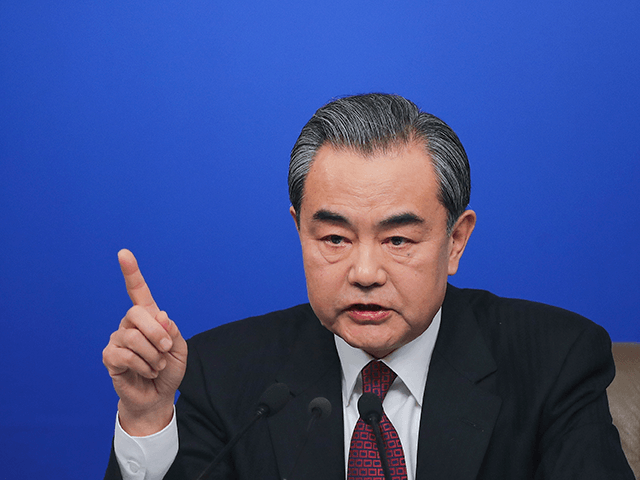Chinese Foreign Minister Wang Yi delivered a speech at the Munich Security Conference this weekend partially focused on discouraging Western businesses from seeking to invest elsewhere to avoid funding China’s extensive list of ongoing human rights atrocities, warning that divesting from China would be “a historical mistake.”
Wang attended the conference, meant primarily to discuss wars and threats of conflict erupting in hotspots around the world, shortly after the publication of a bombshell report in Germany implicating the automaker Volkswagen yet again in profiting from slavery in China. This time, the German newspaper Handelsblatt and human rights researcher Adrian Zenz revealed evidence, including photos of the apparent slaves, indicating that a test track built in occupied East Turkistan by Voklwagen and the Chinese car company SAIC was the product of Uyghur slavery.
Volkswagen responded to the report by stating that it would finally reconsider business operations in the Uyghur heartland in light of the new evidence. Shortly after the publication of the Handelsblatt reported, Volkswagen issued a statement saying “various scenarios are currently being examined intensively” regarding “the future direction of the [joint venture with SAIC]’s business activities in Xinjiang.
The Chinese Communist Party has been conducting a genocide against Uyghurs and other Turkic ethnic groups in East Turkistan, which it administers as the “Xinjiang Uyghur Autonomous Region,” since at least 2017. Dictator Xi Jinping is believed to have imprisoned as many as 3 million people in concentration camps, where survivors say they were indoctrinated, enslaved, and subject to extreme torture, including electroshock and gang rape. Beijing claims that the concentration camps are “vocational and educational training centers” and by 2019 claimed most victims had “graduated” from the camps.
The “graduates” were shipped across the country to work as slaves in cotton fields, factories, and, reportedly, projects like the Volkswagen test track.
RELATED: World Uyghur Congress’ Mahmut Slams Olympic Sponsors as “Putting Profit over Human Life”
Volkswagen is far from the only company implicated in Chinese slave labor. In 2020, the Australian Strategic Policy Institute (ASPI) published its landmark report Uyghurs for Sale that found evidence of 83 global household-name companies using Chinese supplier factories that benefitted from Uyghurs slavery. In addition to Volkswagen, companies such as Apple, Nintendo, and BMW appeared on that list.
More recently, on Wednesday, the Financial Times reported, citing anonymous sources, that American customs officials had impounded thousands of vehicles tied to a Volkswagen parent group using Chinese suppliers.
“Thousands of Porsche, Bentley and Audi cars have been impounded in US ports after a supplier to parent group Volkswagen found a Chinese subcomponent in the vehicles that breached anti-forced labour laws,” the magazine relayed. “The issue affects about 1,000 Porsche sports cars and SUVs, several hundred Bentleys, and several thousand Audi vehicles, according to people briefed on the details.”
At Munich, Wang insisted that China, arguably the world’s most prolific human rights abuser, was “a responsible major country that will keep its major principles and policies consistent and stable.”
“Those who attempt to shut China out in the name of de-risking will make a historical mistake,” Wang said, according to the South China Morning Post.
Wang addressed the Volkswagen situation directly, insisting that the evidence against China was “fabricated information.”
“The so-called forced labor is only a groundless accusation,” the foreign minister asserted, urging concerned parties to visit East Turkistan. “Forced labor” is the term used by mainstream human rights groups to describe China’s enslavement of Uyghurs; the international legal community typically describes forced labor as a form of “modern-day” slavery.
China regularly hosts friendly delegations of Islamic organizations and pro-communist journalists in East Turkistan, ignoring visa applications from conservative, skeptical, or authentic human rights voices.
In the official summary of his remarks published by the Chinese Foreign Ministry, Wang declared, “the next China is still China,” inviting more foreign investment.
“Today, rejecting decoupling has become an international consensus. More people have come to realize that the absence of cooperation is the biggest risk. Those who attempt to shut China out in the name of de-risking will make a historic mistake,” the Foreign Ministry recalled.
RELATED: Chinese Concentration Camp Survivor — I Saw People Tortured for Denying Xi Jinping Is God
“The world economy is like a big ocean that cannot be cut into isolated lakes,” Wang reportedly said. “The trend toward economic globalization cannot be reversed. We need to work together to make globalization more universally beneficial and inclusive so that more countries and people can benefit from the process.”
Defending Wang’s appearance in Munich on Monday, Foreign Ministry spokeswoman Mao Ning told reporters that China’s struggling economy was “as vibrant and resilient as ever” and that Xi’s regime would “focus energy on realizing Chinese modernization, seek faster progress in high-quality development, expand institutional opening up and bring more dividends to the rest of the world.”
Responding to the allegations against Volkswagen, Mao held the Chinese government line, insisting, “some political forces have spread too many rumors and created too much disinformation about Xinjiang in the world.”
“‘Forced labor’ is one of these. By concocting these lies, they are aiming to destabilize Xinjiang and hold back China’s development and revitalization,” Mao continued. “What they are actually doing is to force ‘de-coupling,’ unemployment and poverty on Xinjiang under the pretext of human rights. Such attempts will never succeed.”
Follow Frances Martel on Facebook and Twitter.
